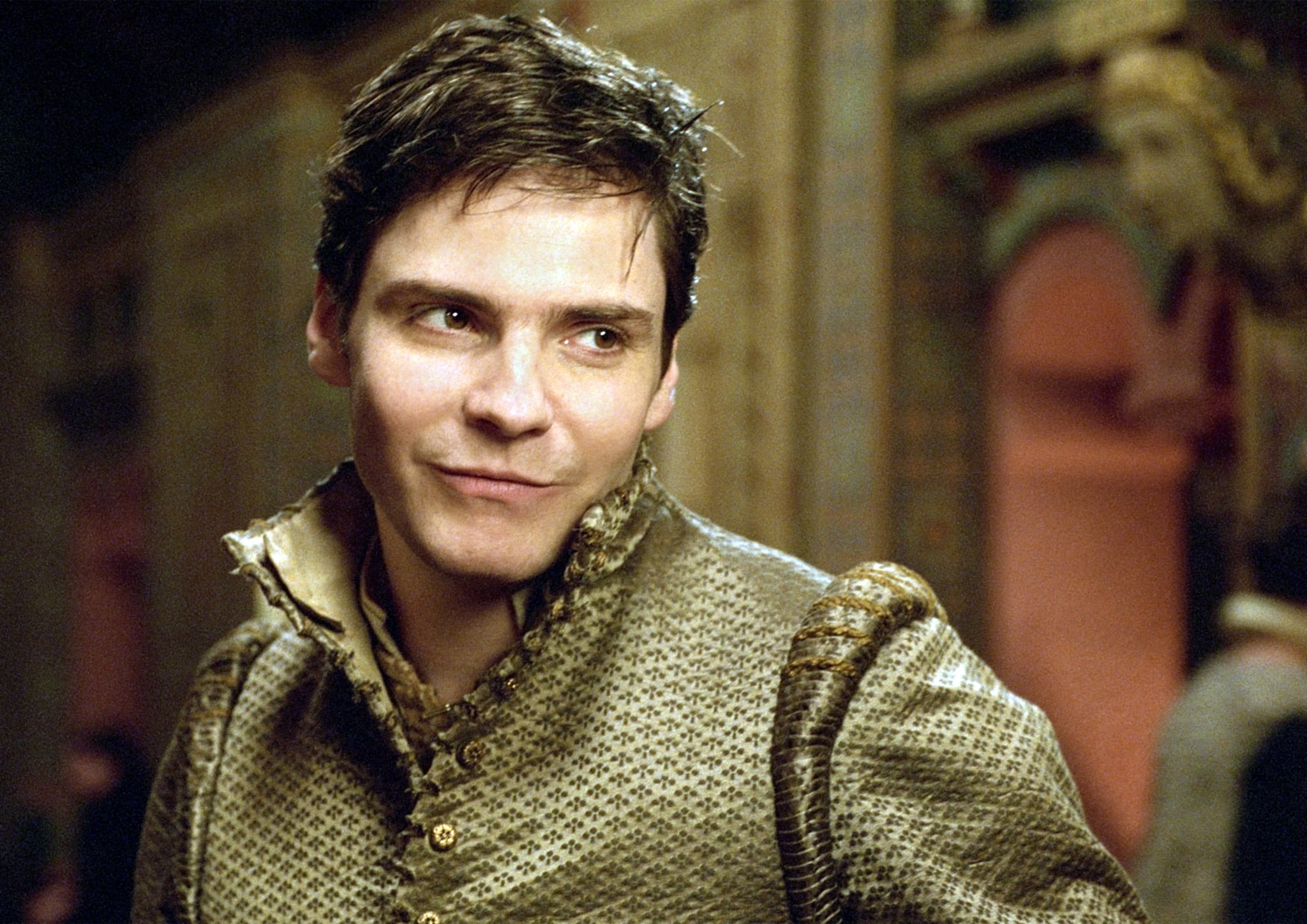Tordesillas, Castile. 15th of August, 1522.
Charles reached for her hands as they stood in the halls of the Royal Palace of Tordesillas, smiling at her, “Are you nervous?”
Anne smiled, breathless. To say that she was nervous was to put it mildly. Her heart was racing, her stomach was tied in a knot and her hands were trembling, palms covered in sweat. She was about to meet Charles’ mother, Queen Juana and his sister, the Infanta Catalina. They were her new mother and sister, her royal in-laws. It was understandable that she was nervous on such an important occasion.
“A little,” she told Charles, “What if they don’t like me?” It was a thought that plagued her since they left Toledo, days before.
“Don’t worry, my dear,” said the Emperor, “They will love you as I do. How can they not?” He pressed a light kiss to her lips, the gentlest of touches, and Anne sighed, feeling a weight being lifted off her shoulders.
She smiled, a little reassured, and smoothed down invisible wrinkles on her golden skirts. Anne wore the first of many gowns Charles had commissioned for her, a black and yellow dress made in the Imperial fashion, with the Habsburg colours. She wore a diamond necklace that Charles gave her before they were wed and her B pendant on her neck, a feathered golden hat on her head. Anne had foregone her hoods, as she thought her favoured French fashion would bother the Spaniards, though she could never wear her hair completely visible as her new ladies did. She felt as if she was naked and vulnerable.
But she was happy to be wearing such an outfit. She felt more certain in her position as Queen and Empress and, well. One could not meet one’s mother-in-law in rags.
“Very well,” she said, “I’m ready.”
Charles smiled and took her hand, leading her down the hallway and into the royal apartments. Anne tried to smile as she walked, but found that she could not, so nervous and anxious that she was. Her heart still raced in her chest, and she was half-afraid that it would slip out between her ribs and fall on her hands.
But nothing prepared her for the shock that came to her when they entered Her Majesty’s apartments. It had a spartan decoration, with just a large bed and an altar for prayer attracting her attention. The room was dark and musty, humid. It was not a place fit for prisoners, let alone a Queen and an Infanta. She looked around, shocked, and then to her husband, feeling as if she was looking at him for the first time. How could he let his mother and sister live in such a place?
There was a woman seated in a chair near a hearth, dressed like a nun, with a young girl at her feet, wearing a simple dark blue dress and a white cap. The woman had a round face and big blue eyes, but her cheeks were sunk in, perhaps from not eating well and she had a displeased expression on. With her reddish-brown hair and light blue eyes, the girl looked infinitely better by comparison, as she was smiling brightly.
“Charles!” she said, not moving from her place at her mother’s feet. Anne noticed that the woman was holding her shoulder, fingers splayed in a spidery grip over her, and likely preventing her from standing up and walking to her brother.
“Catalina,” said Charles, nodding. He looked at the woman, somberly, “Mother.”
Queen Juana said nothing. She only looked at Anne, with her mouth set in a thin white line on her face, and suddenly Anne remembered how her servants whispered about her mother-in-law, how they called her La Loca.
Charles stepped forward, leading Anne by the arm, “Mother, allow me to present to you my wife and Empress: Anne Boleyn.”
Anne gave the Queen a half-curtsy, trying to smile. Margaret of Austria always said one must smile before their difficulties and approach things with an open heart, “It is a pleasure to meet such a graceful lady, Your Majesty.”
Once again, the Queen said nothing. She leaned forward and whispered something in her daughter’s ear, something that caused Catalina to frown.
“Her Grace the Queen insists she will not speak in the presence of an English... woman,” said the Infanta who could only be sixteen at most. Queen Juana muttered something in her ear again, “I will not insult the Empress for you, Mama. I will not.”
Anne gulped and Charles stepped forward, ready to defend her. The Queen whispered more in her daughter’s ear, her eyes never leaving Anne’s, “She asks why you have come to disturb her with news that she already knows.” Catalina pressed her lips together, “She says you and the Empress should not have bothered to come here. That court is more comfortable.”
It was clear to all that these words were not Juana’s. Her back was straightened, her mouth tense. She was not happy with this marriage, with Anne. Catalina was only embellishing her words, making them sound less insulting. It was too much to ask for such a young girl.
Charles stepped forward, so angry that he was trembling.
"Mother, won’t you speak to me?”
Catalina gulped as her mother muttered something in her ear, “She says she will... if I leave and take your new wife with me.”
“Anything you have to say to me...“ her husband started, but Anne stepped forward, and put a hand to his shoulder.
“Charles, it’s alright," she said, calmly, "I’ll be outside with Catalina.”
Her sister-in-law smiled, relieved, and stood up. With her standing, Anne could see how cheap her dress looked, how simple and she felt extravagant and frivolous in her expensive gown. Perhaps she should have worn one of her old English dresses, perhaps this would have made the Queen like her more.
Together, her and the Infanta stepped outside of the room, allowing Charles and his mother to talk in private. The guards bowed when they saw Anne and Catalina, but the Empress was distracted from acknowledging them when her sister-in-law linked their arms together.
"I am so sorry about my mother," said Catalina, "The Queen has been in a terrible mood for some days. She will come around it soon, I'm sure."
Some days? Anne thought, Perhaps since she heard the news of my wedding.
But Catalina did not need to be burdened with such ideas. She was young and bright. Happy, despite her surroundings. Tordesillas could be a grand and luxurious castle for all she acted.
And Anne wondered why it was not. When she heard that Charles' mother lived far from him, she imagined the Queen as the head of her own court, signing petitions and meeting lords. Charles and she were co-monarchs, after all, supposedly ruling together, but it was clear that it was not this way. The Queen was a prisoner in all but name, while Charles ruled alone.
It was a strange thought. Her husband let his mother and sister live in such a place, without lords and ladies to accompany them, play with them. She felt as if she did not know the man whom she had married because her Charles could never do such a thing. The Duke of Burgundy would never treat a lady thus.
But the Emperor would.
“Is she displeased with the match?” Anne asked, “Does she think me not worthy of her son?”
Catalina shook her head, “She is just upset that her nieces have been jilted in your favour,” she said, “The Queen was quite pleased with the betrothal of my brother and our English cousin.”
“Oh,” Anne said. Of course. It seemed that she would never escape those who were offended in the name of Princess Mary. She hesitated, “What do you think of the marriage?”
Catalina smiled, “I’m pleased to have a new sister.”
Later, after Charles returned from speaking with his mother, and they were getting ready to leave Tordesillas, she felt brave enough to speak up about what was bothering her.
As he checked the saddle on her horse, she approached him, putting a hand to his arm, "How can you let your mother and sister live in such a place?"
He barely looked at her. "It was not my choice, but my grandfather's."
"And yet you have the power to change it, do you not?" Anne didn't know this would be so difficult. She should feel vindicated that her mother-in-law lacked the luxurious things she had, that it was payment for her displeasure with the marriage, but she did not. She felt only pity for the woman, a Queen of two kingdoms who ruled nothing.
And pity for sweet Catalina too, who did not deserve any of her mother's imprisonment.
"Chares, look at me," she said when he did not answer, his silence telling her all she needed to know. He sighed and stepped away from the white horse, turning to look at her, "I would not like our children to know their own father kept his mother in the most reprehensible of conditions.”
“Anne, if you had heard what she said about you...“ He shook his head.
“Let her say all of that and worse, it won’t hurt me. What will hurt me is having to tell our son that his grandmother, the proud Queen of Spain, was kept a prisoner in some drafty room with barely any of the luxuries she is entitled to as Queen.”
"You don't understand," he said, "She is not just my mother. She is the Queen. Once, the Comuneros, nobles who tried to rebel against my ruling, turned to her for help. If she had given them her approval, I would have been sent back to Flanders packing."
"But she did not," said Anne, "Catalina and Juana are a loyal mother and a loyal sister. They deserve better than this. Can't you see? Catalina is fifteen. She needs friends, she needs fresh air, she needs tutors, she needs..."
"Catalina has tutors," Charles murmured, interrupting her, "When I came here for the first time in 1517, I tried to take Catalina to court, remove her from this place. My mother threatened to kill herself in response, so I returned my sister.” He sighed, “But Leonor took it upon herself to improve their conditions. She hired tutors for her, dressmakers. She created a semblance of a household for them.”
“Then I love my sister-in-law for it,” said Anne, “And I ask of you, leave to continue her work.”
Charles hesitated, then nodded.
Last edited:









